Quercetin Medication Interaction Checker
Check Your Medication Risk
This tool helps you determine if quercetin supplements may interact with your medications. Remember: always consult with your healthcare provider before combining supplements and medications.
Select medications and click "Check Interactions" to see results.
When you take a quercetin supplement, you might think you’re just boosting your immune system or fighting inflammation. But what you’re really doing could be changing how your body handles medications-sometimes dangerously so. Quercetin, a natural compound found in apples, onions, and berries, is now one of the most popular supplements on the market. In 2022, global sales hit $387 million. Around 18 million Americans take it, and nearly half of them are using doses over 500 mg a day. That’s not a small amount. At those levels, quercetin doesn’t just sit there quietly. It starts interfering with your liver and gut enzymes, the very systems that break down your prescriptions.
How Quercetin Slows Down Drug Breakdown
Your body uses a group of enzymes called cytochrome P450 (CYP) to process most medications. These enzymes act like molecular scissors, cutting drugs into pieces so they can be cleared from your system. Quercetin doesn’t just nudge these enzymes-it shuts them down. Research shows it’s a strong inhibitor of CYP3A4, CYP2D6, and CYP2C19, three of the most important drug-metabolizing enzymes. At concentrations found in people taking high-dose supplements, quercetin can block up to 85% of CYP2D6 activity and 70% of CYP3A4.
What does that mean for you? If you’re on a drug that relies on these enzymes to be broken down, your body can’t clear it fast enough. The drug builds up in your bloodstream. For some medications, even a 20% increase can cause serious side effects. For others, it can be life-threatening.
Drugs That Can Become Dangerous with Quercetin
Not all medications are affected the same way. Some are highly sensitive to even small changes in how they’re metabolized. These are called drugs with a narrow therapeutic index-meaning the difference between a safe dose and a toxic one is tiny.
- Warfarin: Quercetin can raise INR levels by 0.8 to 1.5 points, increasing bleeding risk. A single point rise can turn a stable patient into one needing emergency care.
- Cyclosporine: Used after organ transplants, this drug must stay within a very tight range. Quercetin can push levels up by 30-50%, raising the risk of kidney damage or rejection.
- Abemaciclib: A cancer drug. Quercetin increases its concentration by 25-35%, which can cause severe diarrhea, low blood cell counts, and fatigue.
- Acenocoumarol: Another blood thinner. Studies show quercetin raises its levels by 30-45%.
- Apixaban and Rivaroxaban: These newer blood thinners are affected not just by enzyme inhibition but also by quercetin blocking transporters like BCRP and OATP1B1. This means less drug gets cleared from your blood, and more stays active.
- Statins: Atorvastatin and simvastatin are metabolized by CYP3A4. Higher levels can lead to muscle damage and a rare but serious condition called rhabdomyolysis.
Even common painkillers like acetaminophen aren’t safe. Quercetin can increase its levels by 20-30%. That might not sound like much, but if you’re already taking the maximum daily dose, you could be pushing into toxic territory.
Why Food Isn’t the Same as Supplements
You might be thinking: “I eat onions and apples every day. Isn’t that the same as taking a pill?” The answer is no. When you eat quercetin in food, it’s bound to sugar molecules (glycosides) like rutin. These forms are poorly absorbed and weakly inhibitory. But supplements contain the aglycone form-pure quercetin-designed to be absorbed quickly and in high amounts. One 500 mg supplement delivers more active quercetin than you’d get from eating a pound of onions.
Studies show quercetin glycosides (like those in food) are only about 30-40% as potent as the free form in supplements. So yes, your daily apple is fine. Your 1,000 mg capsule? Not so much.
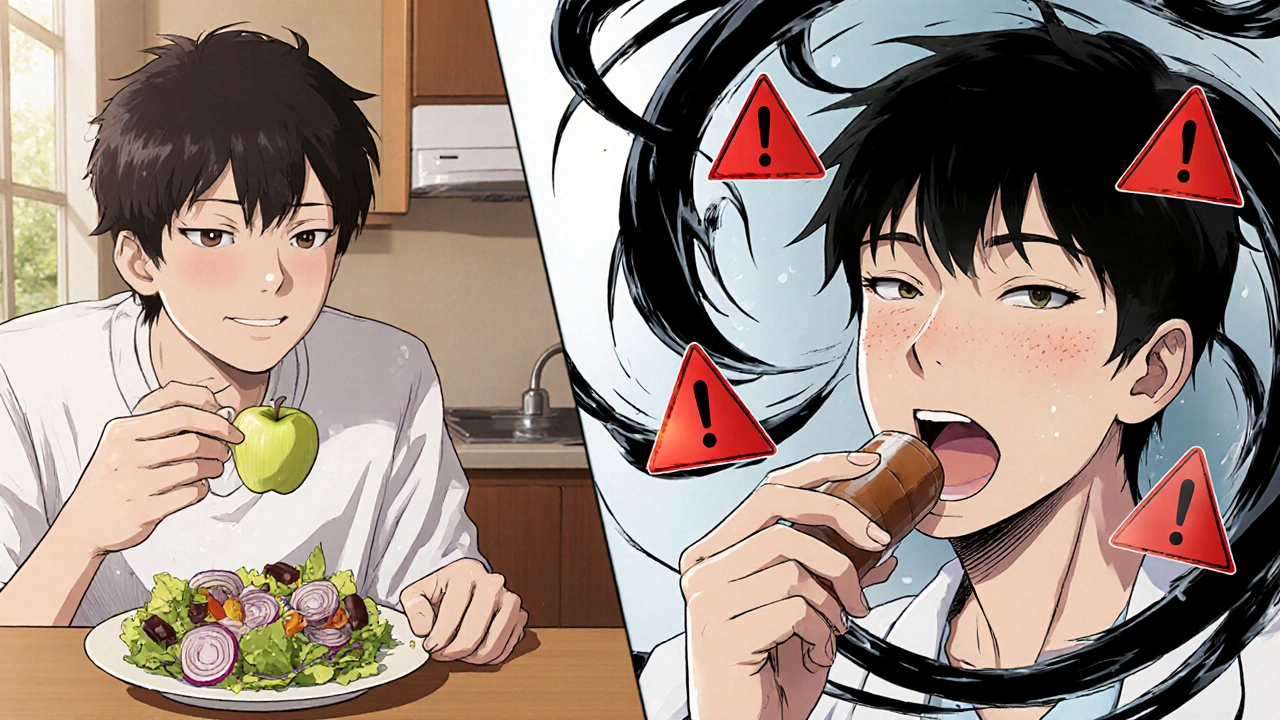
Transporters Matter Too-It’s Not Just About the Liver
Most people think drug interactions are all about liver enzymes. But quercetin also blocks transporters-proteins that move drugs into and out of cells. It strongly inhibits OATP1B1 and OATP1B3, which pull statins and other drugs into the liver for processing. It also blocks BCRP, which pushes drugs out of the gut and kidneys.
This means quercetin doesn’t just slow drug breakdown-it traps drugs in your body. For drugs like rosuvastatin or methotrexate, this dual effect (enzyme + transporter inhibition) can cause levels to spike by 50% or more. That’s why even people with normal liver function can end up with toxic drug levels when they take quercetin supplements.
Who’s at Highest Risk?
Not everyone who takes quercetin will have a problem. But certain groups are far more vulnerable:
- People over 65: Their ability to clear quercetin drops by 25-40%, so it lingers longer and causes more inhibition.
- Those on multiple medications: The more drugs you take, the higher the chance one of them is affected. Polypharmacy isn’t just common-it’s dangerous with quercetin.
- Patients with liver or kidney disease: Their bodies are already struggling to clear drugs. Quercetin adds another layer of stress.
- People taking immunosuppressants: Cyclosporine, tacrolimus, sirolimus-all affected. A small rise in levels can trigger organ rejection.
Even if you’re young and healthy, if you’re on any prescription drug, you should treat quercetin like a drug-not a vitamin.
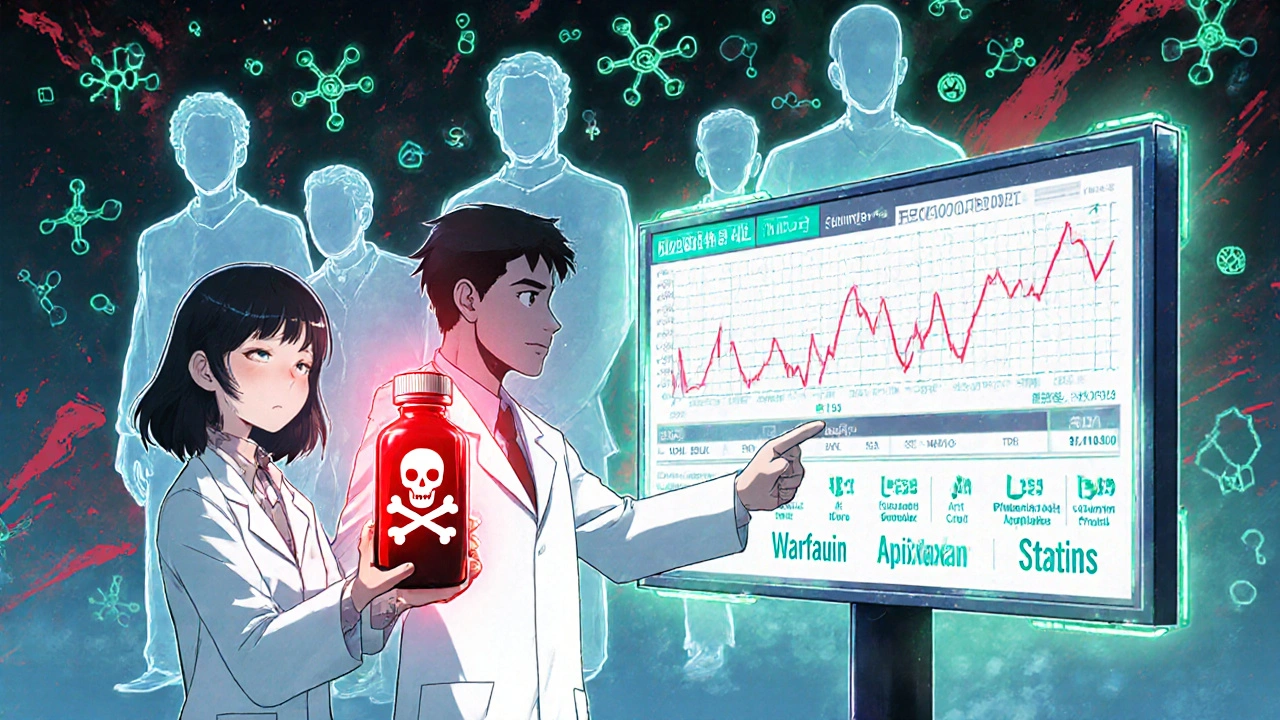
What the Experts Say
The European Food Safety Authority (EFSA) warns that quercetin supplements above 1,000 mg/day pose a real risk for drug interactions. The FDA calls it a “dietary supplement of concern” and recommends that new drugs be tested for interactions with quercetin at concentrations seen in supplement users. The American Society of Health-System Pharmacists (ASHP) says quercetin should be avoided entirely with direct oral anticoagulants like apixaban and rivaroxaban.
Studies in rats show quercetin can increase the blood levels of midazolam (a sedative) by more than two times. While human data is still limited, the pattern is clear: quercetin doesn’t just interact-it amplifies. And because it’s sold as a supplement, most people don’t tell their doctors they’re taking it.
What You Should Do
If you’re on any prescription medication and you take quercetin, here’s what to do:
- Stop taking quercetin supplements if you’re on blood thinners, cancer drugs, immunosuppressants, statins, or any drug with a narrow therapeutic index.
- Don’t assume “natural” means safe. Just because it comes from a plant doesn’t mean it won’t interfere with your meds.
- Talk to your pharmacist. They see drug interactions every day. Bring your supplement bottle to the pharmacy and ask: “Could this affect my medications?”
- If you must take it, keep the dose under 250 mg/day and separate it from your meds by at least 4-6 hours. This can reduce interaction risk by 30-50%.
- Monitor for side effects. Unusual bruising, fatigue, muscle pain, nausea, or dizziness could be signs your drug levels are too high.
The bottom line: Quercetin isn’t harmless. At supplement doses, it’s a potent biochemical modifier. And if you’re taking medications, that makes it a potential health hazard.
What’s Coming Next
The FDA is working on new labeling rules for high-risk supplements like quercetin, expected in 2024. Clinical trials are underway to better understand exactly how much quercetin raises drug levels in real people. Until then, the safest choice is simple: if you’re on medication, skip the high-dose quercetin. Your body will thank you.
Can I take quercetin if I’m on blood pressure medication?
It depends. If you’re on a calcium channel blocker like amlodipine or verapamil, quercetin can increase its levels by 20-40%, potentially causing low blood pressure, dizziness, or swelling. If you’re on an ACE inhibitor like lisinopril, the risk is lower, but still not zero. The safest approach is to avoid quercetin supplements unless your doctor approves it after checking your specific meds.
Is quercetin safe with antidepressants?
Many antidepressants, especially SSRIs like fluoxetine and sertraline, are metabolized by CYP2D6 and CYP3A4-both strongly inhibited by quercetin. This can raise drug levels enough to cause serotonin syndrome: a dangerous condition with symptoms like agitation, rapid heart rate, and high fever. Avoid quercetin supplements if you’re on any antidepressant unless your psychiatrist confirms it’s safe.
Does cooking destroy quercetin in food?
No, cooking doesn’t destroy quercetin. In fact, lightly steaming onions or boiling apples can make the quercetin more available for absorption. But since food sources contain the less potent glycoside form, you’d need to eat massive amounts to reach supplement-level exposure. Eating quercetin-rich foods is safe and healthy-it’s the concentrated supplements that are risky.
How long does quercetin stay in my system?
Quercetin has a half-life of about 11-28 hours, depending on your metabolism and liver function. That means it can still be active in your body 24-48 hours after your last dose. If you’re taking a medication once a day, spacing quercetin by 4-6 hours won’t fully eliminate the risk. For high-risk drugs, stopping quercetin entirely is the only reliable solution.
Are there any supplements that are safer than quercetin?
Yes. Vitamin C, magnesium, and omega-3s have minimal interaction risk with medications. If you’re looking for anti-inflammatory support without the drug interaction risk, consider these instead. Always check with your pharmacist before starting any new supplement, even ones labeled “safe.”

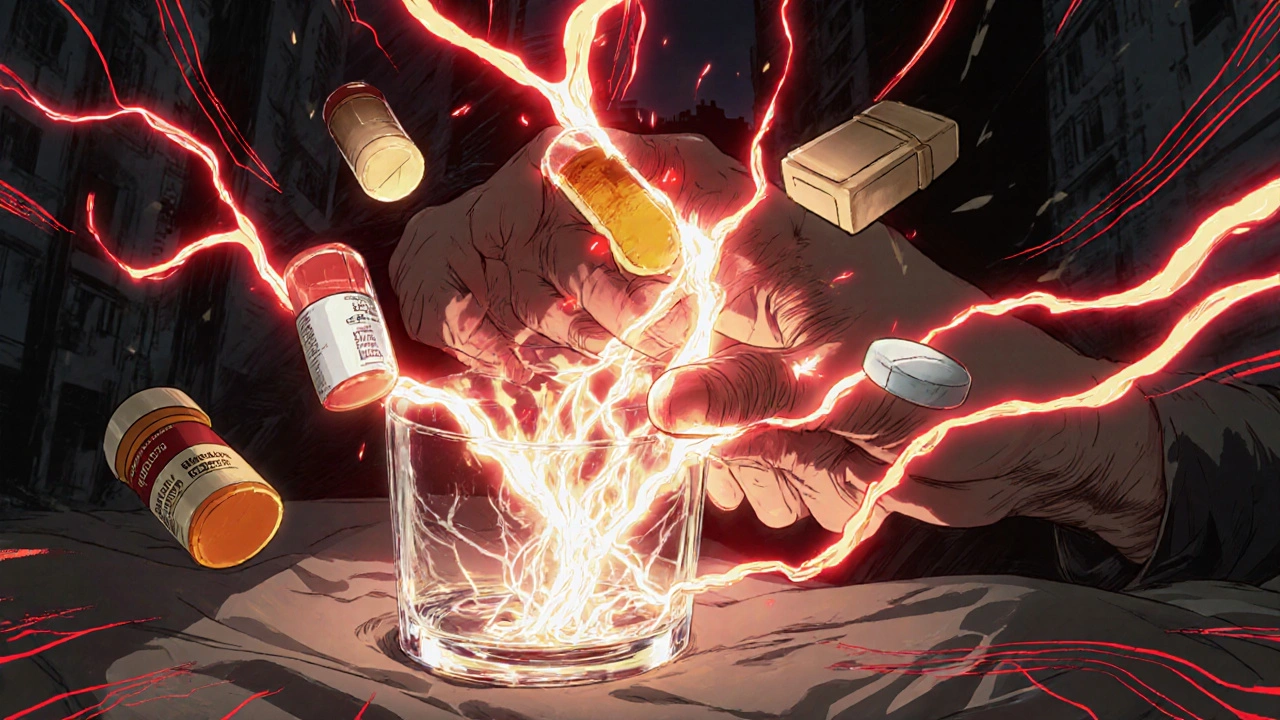


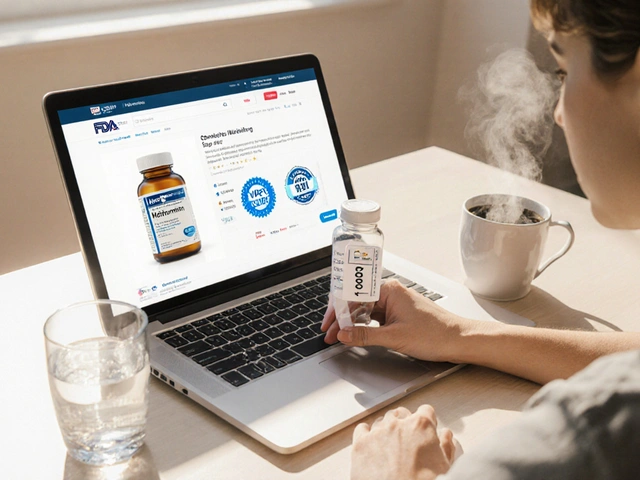
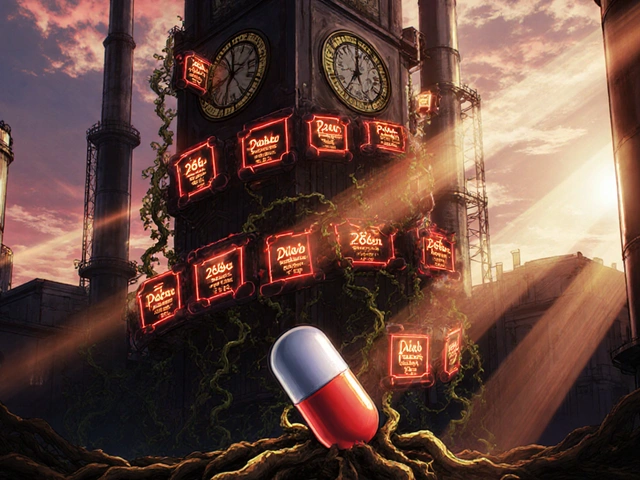
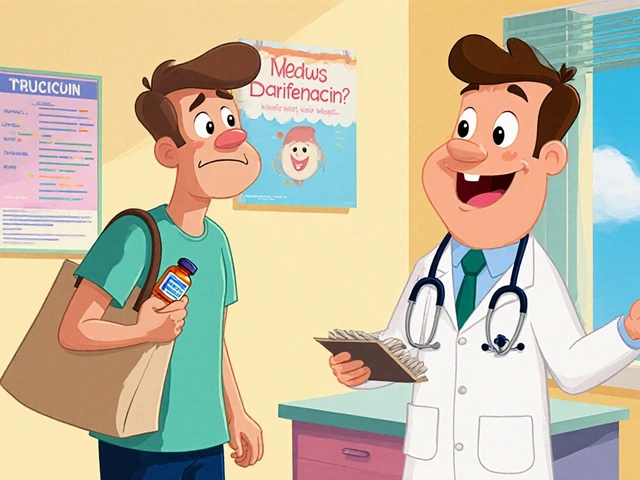
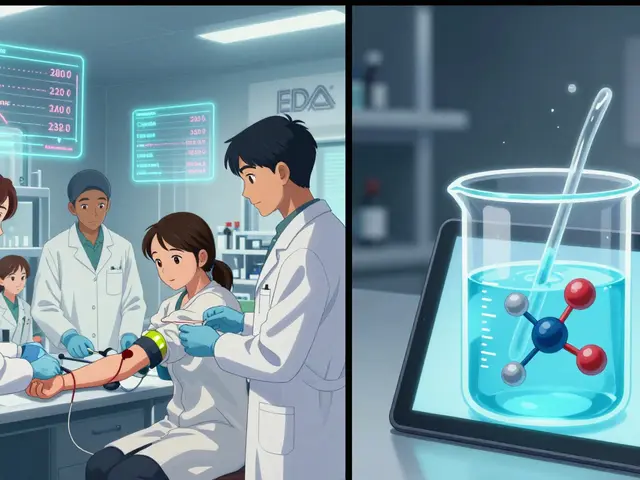
Dolapo Eniola November 24, 2025
Bro this is why I stopped taking all that 'natural' crap after my cousin ended up in the ER from mixing quercetin with his blood thinners. You think you're being healthy but you're just playing Russian roulette with your liver. Stop pretending supplements are harmless just because they come from plants. They're drugs. Period. 😤
Agastya Shukla November 26, 2025
Interesting breakdown. The CYP3A4 and OATP1B1 inhibition kinetics are particularly concerning. The paper by Zhang et al. 2021 showed IC50 values for quercetin against CYP2D6 at 2.3 µM - well within plasma concentrations achieved with 500mg+ supplements. Also worth noting: quercetin’s inhibition is time-dependent, not just competitive. That means even spaced dosing doesn’t fully mitigate risk.
Josh Zubkoff November 26, 2025
Okay so let me get this straight - we’ve got a billion-dollar supplement industry selling a compound that’s basically a biochemical grenade in the form of a pill, and the FDA is still treating it like it’s herbal tea? And people wonder why healthcare costs are insane? This isn’t just negligence, this is corporate malpractice wrapped in a vegan label. I mean, if this were a prescription drug, it would’ve been pulled from shelves in 2018. But nope, you can buy it next to protein powder at GNC like it’s a damn smoothie ingredient. Wake up people. This isn’t wellness. It’s pharmacological chaos with a yoga mat.
Leisha Haynes November 28, 2025
So basically quercetin is the sneaky ex who shows up at your birthday party and ruins everything because they 'just wanted to say hi' 🙄
And you're like 'wait you're not invited' but they brought snacks and now your meds are in the ICU. Natural? Sure. Safe? Honey no. I stopped taking mine after my pharmacist gave me that look - you know the one. The 'I've seen this movie before and you're the main character who dies in act two' look.
Amy Hutchinson November 29, 2025
OMG I just realized I’ve been taking this with my statin for months 😳 I thought it was just for my allergies but now I’m sweating thinking about rhabdo. Should I just stop cold turkey or ease off? I’m scared to tell my doctor I took a random supplement from Amazon
Archana Jha December 1, 2025
They don’t want you to know this but quercetin is just a distraction from the real issue - the pharmaceutical cartel controls everything including the FDA and your doctor’s paycheck. They let you take this because it makes you feel like you’re doing something but really they’re just making you dependent on more pills to fix the side effects. The truth? The government and Big Pharma are scared of plant medicine because it’s free and they can’t patent it. That’s why they scare you with 'drug interactions' - it’s a fear tactic. Eat onions. Be free. 🌱
Andrew McAfee December 1, 2025
Just came back from a trip to Kerala - people there eat onions with every meal and live to 90. They don’t take pills. They eat food. The idea that you need to extract one compound and blow it up to 500mg is pure Western madness. We used to call this 'food as medicine' - now it’s 'supplement as weapon'. We’ve lost the plot. Just eat your apples. Stop trying to biohack your way to health. Your body knows how to do this.
Srikanth BH December 2, 2025
Hey everyone - I get how scary this sounds but don’t panic. If you’re on meds and taking quercetin, just pause it for a week and see how you feel. Talk to your pharmacist - they’re the real heroes here. And if you’re looking for something safe to replace it? Try turmeric with black pepper. Same anti-inflammatory benefits, way less risk. You got this. One step at a time 💪